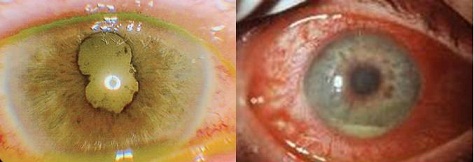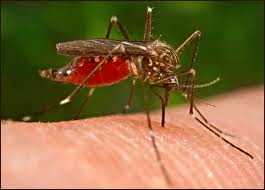
What is uveitis and why is it important?
Uveitis is the inflammation of the uveal tissue of the eye. The uvea is the middle coat of the eyeball, located between the sclera (outer shell) and the retina (inner wallpaper).
In the United States, uveitis occurs in 30,000 to 40,000 people per year. It seems to be a little bit more common in females, and usually happens between 20 and 60 years of age. Just be aware that any age group can be affected, including children.
Sometimes the cause of the uveitis is very clear cut, such as recent injury or surgery to the eye. Uveitis can also be caused by underlying systemic infections (such as tuberculosis and syphilis) or autoimmune disease (such as inflammatory bowel disease, ankylosing spondylitis and sarcoidosis), where the immune system mistakenly attacks your body’s own tissues.
Most of the time though, the cause is unknown despite extensive investigations and tests. It just happens.

Two examples of how uveitis may manifest. Uveitis can cause visual loss by damaging the macula (central part of the retina that is important for seeing fine detail) and the optic nerve (which conveys nerve impulses from your eye to your brain). Not only that, uveitis can also cause other complications such as cataract and glaucoma. It can also trigger age-related macular degeneration.
If untreated, it has the potential to cause pain and, more importantly, sight loss and permanent blindness. Uncontrolled uveitis gives rise to other eye problems such as macular edema, glaucoma and cataract. It is no wonder uveitis is the third leading cause of blindness in the U.S., behind macular degeneration and glaucoma.
Treatment is with anti-inflammatory and immunosuppresant medication, which needs to be started early to prevent vision loss.
At present, there is no truly effective way to completely stop uveitis from occurring. There is no evidence of a 100% proven uveitis prevention treatment regime.
Having said that, if you can follow this simple 7-step guide to uveitis prevention, then you will decrease your risk of vision loss from uveitis.
1. Recognize early symptoms of uveitis
Okay, so this isn’t exactly uveitis prevention. But there’s a lot to be said for recognizing the symptoms early, so that the inflammation can be treated early. The earlier uveitis is treated, the easier it is to get the inflammation under control.
If you haven’t experienced uveitis before, then it will be a bit more difficult to know what symptoms to expect. So how do you know if you have uveitis? The 3 commonest symptoms are: extra sensitivity to light (photophobia), tenderness of the eyeball (especially when touched or pressed on), and floaters.
If you are someone who gets recurrent episodes of uveitis, you will know when an attack is coming. Often you will feel the discomfort in your eyes even before any evidence of inflammation is seen clinically. This is the ideal time to be started on treatment. You will find that treatment works much faster, your symptoms settle much quicker, and you can discontinue or reduce your medications earlier.
Treating and controlling the uveitis early means that you put it out before it has any chance to do any damage to your eyes. If you are unsure whether or not you have symptoms of uveitis, it is best to have your eyes examined by an ophthalmologist.
2. Quit smoking
Smoking is a significant risk factor for many eye and general health problems. Eye conditions that can worsen with cigarette smoking include cataract, age-related macular degeneration and retinal vein occlusions.
Cigarette smoke contains many harmful chemicals, such as tobacco-specific N-nitrosamines (TSNAs), benzene, pesticides, arsenic, cadmium, cyanide, and many many more. These toxins circulate all around the body and cause oxidative damage to the cells of the eye, thus promoting inflammation and affecting its ability to heal.
Smokers are twice more likely to develop uveitis than non-smokers. Smoking also increases the severity of the uveitis, so you are more liely to need more treatment with steroid eye drops, and to suffer more complications such as cataract and macular edema.
The evidence is unequivocal. I don’t want to sound preachy, but if you are a smoker, then you really do need to stop smoking. If that is not possible, then please at least try to cut down on the amount you smoke.
3. R&R – Have enough rest and relaxation
In some people, stress is a trigger factor for uveitis and also other eye conditions, such as central serous chorioretinopathy.
Having sufficient rest ensures that your body and eyes recover from daily exertions. Schedule some time to relax your mind and body daily, even if only for 5 minutes.
You can meditate, go for a walk, have a massage or simply do something you enjoy doing that will take your mind off your worries. This will make you feel much better overall and may help to reduce the recurrence of uveitis.
4. Eat a healthy and balanced diet for uveitis
Good nutrition and a healthy diet are important to maintain overall eye health. Aim for a healthy diet with plenty of fruits and vegetables while minimizing trans-fatty acids.
Eyes affected by uveitis are more prone to the damaging effects of oxidative free radicals damage. To combat the effect of free radicals, ensure that your diet is full of natural antioxidants to help boost the immune system.
These include vitamin A (carrots, apricots, papayas), vitamin C (berries, citrus fruits, tomatoes), vitamin E (avocados, green leafy vegetables, fish) and zinc (whole bran, eggs, peanuts).
5. What about supplements for uveitis?
There is now evidence that Vitamins C, D and E may have a protective role against uveitis.
Researchers from Melbourne, Australia have found that vitamin D supplementation was associated with reduced uveitis activity. Patients with uveitis were more likely to have low levels of vitamin D compared to those without, and those with active uveitis had even lower vitamin D levels.
A separate study found that vitamins C and E, taken twice daily in addition to standard treatment for acute anterior uveitis, had better visual acuity than placebo after the 8-week study period.
These results suggest that vitamins C, D and E supplementation may help if you suffer from regular episodes of uveitis.
Turmeric (Curcuma longa) is a yellow spice well known as an ingredient in curries. It has also been used as a medicinal herb in India since ancient times. The main active ingredient of turmeric is curcumin.
Researchers from Italy found that 600 mg curcumin in Meriva (a proprietary blend of curcumin) taken twice daily, and used concurrently with standard treatment, was well tolerated and was able to reduce symptoms of recurrent anterior uveitis within a few weeks of use.

You can purchase Meriva and other highly-rated curcumin supplements through Amazon and iHerb.
If you wish to take curcumin for uveitis and help maintain the health of your eye, below are highly-rated and recommended supplements that are available for you to purchase through Amazon:
Please note that turmeric may increase your risk of bleeding. Therefore, please use with caution if you are taking blood-thinning medications (such as aspirin and warfarin), or if you have a health condition that increases bleeding (such as chronic liver disease or low blood platelets). Make sure you consult with your family doctor first before taking turmeric or curcumin supplements.
See Related: Natural remedies for uveitis
6. Avoid exotic infections, especially when travelling
Infections are well-recognized as important causes of uveitis. Many infections can cause uveitis, and these include tuberculosis, malaria, Lyme disease, toxoplasmosis, syphilis and herpes (both herpes simplex and herpes zoster). Fortunately, your risk of such infections can be reduced by taking simple and common sense precautions.
When you travel, especially to exotic foreign lands, it is very important that you take all the necessary precautions. This includes taking the necessary prophylactic medications and ensuring that your immunizations are up to date.
One of the most lethal infections is tuberculosis. It is caused by various strains of mycobacteria, most commonly Mycobacterium tuberculosis. It is an airborne disease, and spreads through the air when an infected person coughs, speaks, sneezes or spits out. When travelling to tuberculosis-endemic countries, make sure that you are immunized and avoid overcrowded areas with poor sanitation.

Another serious infection is malaria. Malaria is caused by Plasmodium parasites that are transmitted through bites from the Anopheles mosquito. When in malaria-endemic countries, take your medications as prescribed, use insecticide-impregnated bed nets, and wear long sleeves to minimize exposed skin.
Be aware also of infections that are associated with animals, and try to avoid unnecessary contact with animals that you are not familiar with. For example, Lyme disease is an infection caused by the bacteria Borrelia burgdoferi, which is transmitted by deer tick bites. Another example is toxoplasmosis, caused by the parasite Toxoplasma gondii which lays its spores in cat litter. If contact is unavoidable, make sure you wear gloves and wash yourself thoroughly afterwards.
Finally, some infections that can cause uveitis are also transmitted sexually. One of the most important is syphilis. Syphilis is caused by the spirochete Treponema pallidum, and can result in skin, kidney, liver, heart and neurological problems if not treated.
I rarely get the chance to advise on sexual health matters, so in this respect, it gives me great pleasure to advise readers to always practise safe sex.
7. Protect your eyes from trauma
When your eye suffers an injury, inflammation will occur. This is called traumatic uveitis. Traumatic uveitis will generally settle with steroid eye drops unless the injury is severe.
In cases of severe injury (especially in penetrating eye injury and also including multiple eye surgery), the other eye becomes at risk of developing uveitis. This form of uveitis is called sympathetic ophthalmia. Inflammation occurs because the immune system becomes exposed to the uveal tissues of the eye and recognizes them as being foreign. When this happens, the immune system starts attacking the uveal tissues of both eyes.

An example of sympathetic ophthalmia:
A. Penetrating injury to the left eye, resulting in a damaged iris and distorted pupil
B. Sympathetic ophthalmia, with Dalen Fuchs nodules (white arrows) in the right eye
Although rare, sympathetic ophthalmia is a potentially blinding condition that needs to be aggresively managed with steroids and immunosuppression medication if required.
Preventing avoidable trauma is therefore important, but is often overlooked and neglected. You can protect your eyes from trauma with simple, common sense measures such as:
– Wearing seat belts when driving
– Wearing protective goggles when playing sport
– Wearing appropriate eye protection when operating machinery
– Wearing appropriate eye protection when handling firearms
I have listed some top quality and highly-rated safety glasses and goggles above. My recommendation is not to focus on price but instead to place your eye safety first. The product that you buy has to be fit for purpose and must be able to protect your eye in the event of an accident.
And finally, please don’t forget about your child’s eye health – cushion sharp corners on furniture, remove any easily accessible sharp or pointed objects, and make sure you choose your child’s toys wisely.


